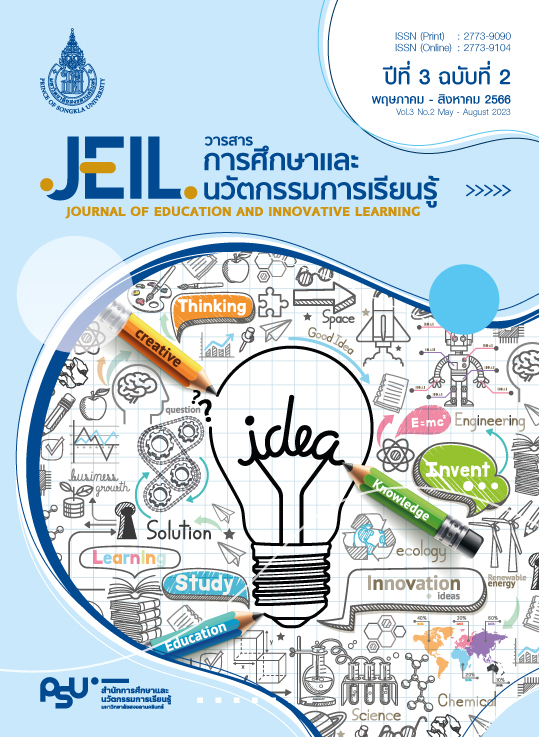นวัตกรรมทางการศึกษา: องค์ประกอบและกลไกการพัฒนาสถาบันการศึกษาไทยสู่สากล
Main Article Content
บทคัดย่อ
ในระบบการศึกษายุคดิจิทัล ผู้เรียนจะเป็นเป้าหมายสำคัญของการจัดการศึกษาทุกระดับที่ต้องได้รับการพัฒนาอย่างมีคุณภาพตามเกณฑ์สมรรถนะการเรียนรู้ยุคใหม่ “นวัตกรรมทางการศึกษา” เป็นนวัตกรรมใหม่ที่เกิดจากแนวความคิด รูปแบบวิธีการ กระบวนการ หรือเครื่องมือต่าง ๆ ที่ออกแบบด้วยความคิดที่สร้างสรรค์เพื่อมาใช้ในแวดวงการศึกษา มีการทดลองใช้และทดสอบประสิทธิภาพอย่างเป็นระบบ ในที่สุดก็กลายเป็นนวัตกรรมที่ได้รับการยอมรับและสามารถนำไปใช้กับการพัฒนาระบบการศึกษาให้มีคุณภาพได้ ส่วนการสร้างองค์กรทางการศึกษาให้เป็นองค์กรแห่งนวัตกรรมทางการศึกษานั้นผู้บริหารย่อมมีบทบาทสำคัญในการกำหนดและควบคุมทิศทางขององค์กรให้บรรลุดังเป้าประสงค์ โดยมีองค์ประกอบที่เกี่ยวข้องกับการที่ผู้นำมีภาวะผู้นำแบบมืออาชีพ มีวิสัยทัศน์ที่พร้อมรับกับการเปลี่ยนแปลงแบบพลิกผัน การจัดโครงสร้างองค์กรและกลไกที่ยืดหยุ่นให้สามารถแลกเปลี่ยนเรียนรู้ได้อย่างอิสระ และการพัฒนาผู้สอนและบุคลากรทางการศึกษาให้สามารถสร้างสรรค์นวัตกรรมใหม่ให้สำเร็จจนกลายเป็นนวัตกรทางการศึกษา ดังนั้น องค์ประกอบและกลไกการพัฒนาสถาบันการศึกษาไทยสู่สากลเกิดจากการที่ผู้บริหารมีภาวะผู้นำเชิงนวัตกรรม สถาบันการศึกษามีบรรยากาศที่เอื้อต่อการสร้างสรรค์นวัตกรรม รวมถึงผู้สอนและบุคลากรมีนิสัยแห่งนวัตกรรมเพื่อสร้างองค์กรแห่งนวัตกรรมการศึกษาที่มีศักยภาพพร้อมในการแข่งขัน และการสร้างมูลค่าเพิ่มแก่หน่วยงานทางการศึกษาไทยมุ่งสู่ความเป็นสากล
Article Details

อนุญาตภายใต้เงื่อนไข Creative Commons Attribution-NonCommercial-NoDerivatives 4.0 International License.
เนื้อหาและข้อมูลในบทความที่ตีพิมพ์ในวารสารการศึกษาและนวัตกรรมการเรียนรู้ ถือเป็นข้อคิดเห็นและความรับผิดชอบของผู้เขียน ซึ่งกองบรรณาธิการวารสาร ไม่จำเป็นต้องเห็นด้วยหรือร่วมรับผิดชอบใด ๆ และไม่สงวนสิทธิ์การคัดลอกบทความเพื่อใช้ประโยชน์ทางวิชาการ แต่ให้อ้างอิงข้อมูลแสดงที่มาของบทความทุกครั้งที่นำไปใช้ประโยชน์
เอกสารอ้างอิง
Aniskina, N., & Terekhova, E. (2019). Innovative methods for quality management in educational organizations. International Journal of Quality & Reliability Management, 36(2), 217-231. doi:10.1108/IJQRM-12-2016-0235
Ayduğ, D., & Ağaoğlu, E. (2023). The mediation role of intentional organizational forgetting in the relationship between organizational learning and innovation management. Journal of Workplace Learning, 35(1), 17-34. doi:10.1108/JWL-10-2021-0129
Brunetti, F., Matt, D. T., Bonfanti, A., De Longhi, A., Pedrini, G., & Orzes, G. (2020). Digital transformation challenges: strategies emerging from a multi-stakeholder approach. The TQM Journal, 32(4), 697-724. doi:10.1108/TQM-12-2019-0309
Chandra, P., Tomitsch, M., & Large, M. (2021). Innovation education programs: a review of definitions, pedagogy, frameworks and evaluation measures. European Journal of Innovation Management, 24(4), 1268-1291. doi:10.1108/EJIM-02-2020-0043
Da'as, R., Watted, A., & Barak, M. (2020). Teacher's withdrawal behavior: examining the impact of principals' innovative behavior and climate of organizational learning. International Journal of Educational Management, 34(8), 1339-1355. doi:10.1108/IJEM-12-2019-0449
Drucker, P. (2015). Innovation and entrepreneurship. Abingdon: Routledge.
Edwards-Schachter, M. (2018). The nature and variety of innovation. International Journal of Innovation Studies, 2(2), 65-79. doi:10.1016/j.ijis.2018.08.004
Inoue, N., & Light, D. (2022). Guiding educational innovation to promote children's non-cognitive abilities to succeed: implementation of the Sesame Street curriculum in Japan. International Journal for Lesson and Learning Studies, 11(4), 245-259. doi:10.1108/IJLLS-02-2022-0020
Konst, T., & Kairisto-Mertanen, L. (2020). Developing Innovation Pedagogy Approach. On the Horizon, 28(1), 45-54. doi:10.1108/OTH-08-2019-0060
Phakamach, P., Onsampant, S., Wachirawongpaisarn, S., Panjarattanakorn, D., Phomdee, R., & Suphasophon, C. (2021). An educational innovative organization in Thailand 4.0. Proceedings of Phayao Research Conference 10th, 3513-3528. Retrieved from http://www.prc.up.ac.th/proceedings/Proceedings10.10.pdf [in Thai]
Phakamach, P., Senarith, P., & Wachirawongpaisarn, S. (2022a). ICT systems development guidelines for educational innovation management of Rajamangala University of Technology in Thailand. Journal of Education and Innovative Learning, 2(2), 109-130. [in Thai]
Phakamach, P., Senarith, P., & Wachirawongpaisarn, S. (2022b). The metaverse in education: the future of immersive teaching & learning. RICE Journal of Creative Entrepreneurship and Management, 3(2), 75-88.
Riccomini, F. E., Cirani, C. B. S., Carvalho, C. C. d., & Storopoli, J. E. (2021). Educational innovation: trends for higher education in Brazil. International Journal of Educational Management, 35(3), 564-578. doi:10.1108/IJEM-07-2019-0245
Saengkaew, P., Soeikrathoke, P., Wachirawongpaisarn, S., & Phakamach, P. (2021). The educational innovative organization in the digital era model for vocational education management under new normal situation in Thailand. Vocational Education Innovation and Research Journal, 5(2), 75-89. [in Thai]
Schildkamp, K., Wopereis, I., Kat-De Jong, M., Peet, A., & Hoetjes, I. (2020). Building blocks of instructor professional development for innovative ICT use during a pandemic. Journal of Professional Capital and Community, 5(3/4), 281-293. doi:10.1108/JPCC-06-2020-0034
Sinlarat, P. (2020). The path to excellence in Thai education. RICE Journal of Creative Entrepreneurship and Management, 1(2), 60-75. doi:10.14456/rjcm.2023.2 [in Thai]
Wilson, K., & Sy, J. (2021). A framework for managing innovation in higher education: lessons learnt from the UAE iPad initiative. Learning and Teaching in Higher Education: Gulf Perspectives, 17(1), 16-28. doi:10.1108/LTHE-08-2020-0013


